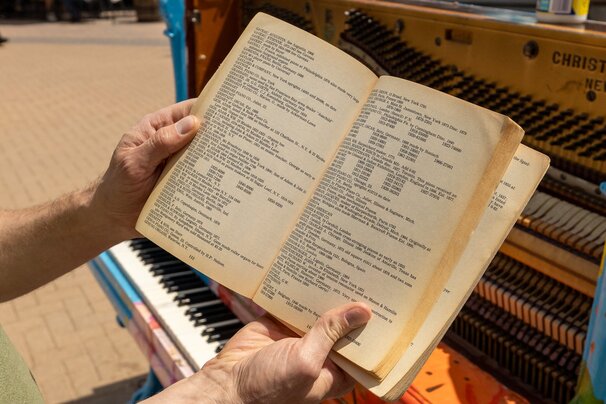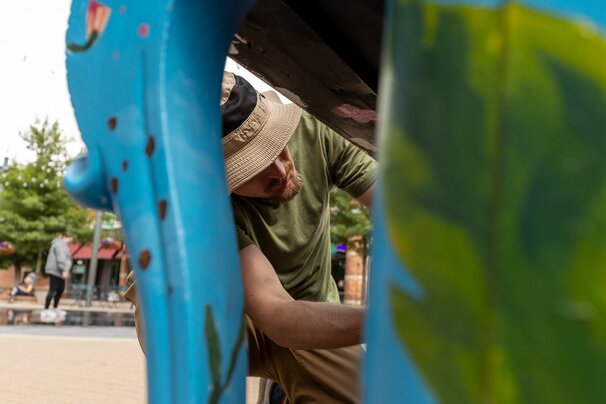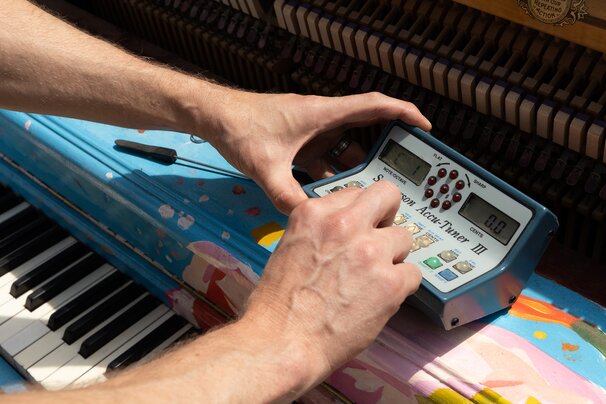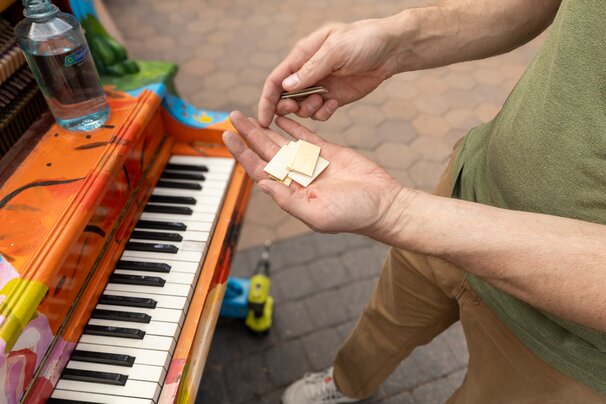Meet the piano tuner who keeps Fort Collins’ outdoor instruments pitch perfect

FORT COLLINS, Colo. — Matt Goheen wore desert-colored work pants, an Army green T-shirt and a full-brim hat as he got to work in downtown Fort Collins. He looked more ready for an audition for “Survivor” than to tune a piano.
Then again, most piano tuners don’t work outside.
“An ideal piano tuning happens in complete silence,” said Goheen, 44, as he removed the top panel of an upright piano located at Old Town Square.
It was a Friday afternoon and anything but silent. Children splashed in a fountain, drinkers clinked glasses at Lucky Joe’s and a man paraded his pet pig on a leash.
Goheen is the go-to tuner for Pianos About Town, the city’s public art project that commissions artists to paint used pianos that rotate throughout the city.
Now in its 15th year, Pianos About Town was originally inspired by British artist Luke Jerram’s, “Play Me, I’m Yours” project. Jerram placed more than 2,000 pianos in public spaces across the globe.
Pianos About Town accepts donations of high-quality used pianos every spring. Artists paint 8 to 12 pianos from May through September. They’re currently painting the program’s 184th piano.
Pianos rotate between 20 locations throughout the city, including Civic Center Garage, Old Town Garage, Firehouse Alley Garage, Foothills Mall and Scotch Pines.
“We've found that the parking structures are really good locations because of the acoustics,” said Liz Good, visual arts coordinator with the City of Fort Collins.
In addition to providing some protection from the elements, sound tends to travel well from the garages.




Once a fixture of the middle class home, piano sales have dropped sharply since their peak at the turn of the 20th century. In 1909, Americans bought more than 350,000 pianos. Last year, fewer than 18,000 acoustic pianos were sold in the U.S. Just two large manufacturers, Steinway and Sons and Mason & Hamlin, continue to make pianos in the U.S.
During World War II, piano factories transitioned to produce airplanes and wood went to build coffins, said Goheen.
Although piano sales recovered somewhat after World War II, designs tended to be smaller. Today, digital pianos make up the overwhelming majority of sales.
“From a public art perspective, [the program] is a pretty low investment. A lot of pianos are around looking for homes these days,” said Good.
The first step to tune a piano is to learn its backstory. Goheen starts by removing wood paneling that shields and the instrument’s innards. Next, he locates its serial number and consults a copy of the “Pierce Piano Atlas” — his is missing its cover — to determine the instrument’s age.
The piano at Old Town Square is a Christman upright, built in 1915. It has since been adorned with painted hummingbirds.
“You find all kinds of interesting stuff inside pianos. If you're lucky, you find jewelry, kids toys from the 60s, Indian Head nickels…” said Goheen, who learned the trade from his father, Fred Goheen, a lifelong piano repairman who retired in 2025.
The program costs roughly $40,000 per year, which is used to cover piano moving, tuning and a $1,000 honorarium for artists. The Bohemian Foundation, a private family foundation in Fort Collins, provides the funding.

Goheen strives to tune each piano to concert pitch, but that’s not always possible. Strings, hammers and other pieces can break, which are often too expensive to fix.
“It’s like surgery,” said Goheen, as he demonstrated how he replaces chipped keys with small pieces of ivory.
Before becoming a tuner, Goheen worked in a post-production house editing subtitles. Tuning can be similarly tedious, but it’s also rewarding, he said.
“I came to realize how valuable of a trade it is,” said Goheen.
Goheen said there’s probably already a shortage of skilled tuners. Over the past two years, Northern Colorado lost the tuning expertise of Goheen’s father, Fred Goheen, Bob Otterman and Ed Ranam, all of whom retired.
All instruments part of Pianos About Town are equipped with a plastic cover, but keeping them outside is not ideal from a preservation standpoint.
The average lifespan of a piano in the program is two years. After that, pianos are disassembled and recycled.
“You never want to expose a piano to direct sunlight. That makes the piano go flat very quickly,” said Goheen.
Humidity, temperature fluctuations and children pounding on the keys add to the instruments’ stress.
“It's a trifecta of badness,” said Goheen. But, “this piano is probably going to go to the dump anyway, so it gives it a few more years of glory.”
Based on facts, either observed and verified firsthand by the reporter, or reported and verified from knowledgeable sources.
